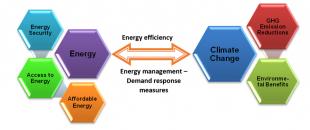Access to affordable, reliable and low-carbon energy plays a critical role for sustainable economies and social development. The technological paradigm shift to innovative and clean energy production and optimal consumption, using locally available distributed energy resources and more efficient technologies, is crucial for environmentally sustainable society. This can be accomplished through improved energy management and efficient use of sustainable resources. Energy and climate change are interlinked with social and economic development (Figure 1). Therefore, improved energy efficiency and energy management programs will play critical role in climate change mitigation.
The transition to a decarbonized economy involves (1) optimal utilization of distributed energy resources (2) developing smart grid technologies and (3) promoting energy efficiency. Developing distributed renewable energy generation and storage are the major interventions. Smart technologies – Internet of things (IoT), Information and communication technology (ICT) and cyber-physical systems help connecting devices, sensors/metering and systems, which enable society to improve services, promote economic growth, and enhance quality of life.
This India-UK partnership will develop capacity-building with main objectve to help tackle the Energy Trilemma by knowledge exchange and joint research in the areas of power engineering, communications and data science for energy. Ultimately, it aims to help promote renewable and decentralised, on-site, clean energy production as well as more efficient energy use, to satisfy the potential demand from the two billion Indian people who still lack access to basic modern electric energy.



